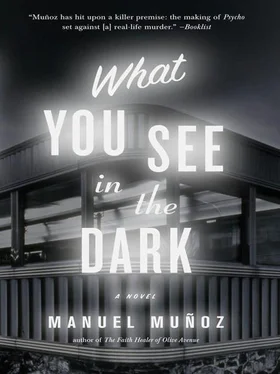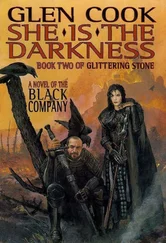At the foot of her door, as soon as she opened it to the morning, she spotted the little jar. She bent down to pick it up. A Gerber baby-food jar, filled to its brim with toasted pumpkin seeds. She held it in her hand for a moment before placing it in her purse along with her apartment key. It was hardly any weight at all, but she could feel the little jar like a stone in her purse, almost pulsing with Cheno’s long patience at her door the previous night. This wasn’t right, the way she was behaving, and sooner or later, Teresa knew, she would have to say something to Cheno. But what, exactly, when all she knew was the uncertain fluttering deep in her own throat at every thought of Dan Watson.
She headed to the shoe store in a roundabout way, wondering if she was in love. She lingered by a sale display of laundry detergent, nail polish, and floor wax at the drugstore and found herself dreaming of using them in a large, beautiful home with Dan’s pickup parked in the driveway. Across the street, she was surprised to see the barber shop not only open but busy — she could see the men waiting in chairs, reading the morning paper, and could even hear the soft buzz of a radio report. Married men, all of them, she suspected, maybe even what Dan would turn into later on, and when she thought this, she spied one of the men looking up from his newspaper, his eyes lingering on her.
She walked away from his gaze and went to the record shop down the street. She studied the album covers pasted up against the windows, Elvis Presley and Peggy Lee and Frank Sinatra, the black discs hanging down from the ceiling on fish-line, each of them with colorful labels that Teresa regarded as if they were jewels. The logos, the rich colors, even the company names: Chess, Atlantic, Peacock, Imperial, Sun, Decca, Mercury, Capitol, Cadence. Since no one was on the street, Teresa said the names aloud, wanting to hear how grand they sounded, each with its own singularity and suggestion, and she stood there dreaming about which life she’d rather have: one with Dan and the pickup in the driveway, the other where she could arrive at one of those studios in an elegant car, the microphone waiting.
To ask for both, she thought to herself, was greedy beyond words. She thought of Cheno, if he daydreamed while yanking nectarines from the branches, what he asked the sky for.
In the bottom of the corner display, she noticed the name Ricky on one of the album covers. She had to lean down to look at it, at him. There he was, a black-and-white picture, but she guessed that his hair was brown, rich and deep, and he looked back at her with eyes she could not guess the color of. Maybe blue. Maybe green. But the long lashes! Casting shadows almost, and she studied the rest of his face — his lean nose, the faint bit of stubble, his eyebrows leaning in to each other, the way his left eye seemed to signal a different kind of feeling: the regret she had heard in his voice last night. That was the eye she focused on, as if she could feel his longing, as if she could fall in love with it and alleviate it. Didn’t Cheno have it, too? And yet why couldn’t she fall in love with him? She put her hand on her purse, feeling the small weight of the jar of pumpkin seeds. Ricky’s bottom lip jutted out thick and full, the upper one much thinner, his mouth holding in a perfect line, capturing who he was — a singer — and how everything that mattered about him centered on the moment he opened that mouth.
For hurt to matter, she thought, you had to be beautiful. She thought of Cheno’s small frame scrambling into the bed of the pickup truck. She thought of Dan Watson, how even he lacked the long lashes and strange eyes of Ricky Nelson. She thought of her father, whom she had never met, and wondered how handsome he was to lure her mother all the way to Texas.
Cars rumbled by more frequently now, so Teresa made her way to the shoe store, waiting outside the doors. Mr. Carson had not yet arrived, nor had Candy, her co-worker. Sunlight warmed the sidewalk. She could feel the heat in her shoes. Mr. Carson was always early, so by the time his Oldsmobile approached the store, she knew it was probably eight thirty.
He parked fastidiously, poking his fat head from the car window to peer down at the painted lines on the asphalt. He locked the car with his key and approached, a paper cup of coffee in one hand, a small white bag in the other.
“You,” he said, searching for the key to the store. “What are you doing here so early?”
He was genuinely surprised, Teresa could tell — there wasn’t a hint of malice in his voice. “Just a few minutes is all,” she replied.
“Well, don’t expect to get off early,” he said, holding the door open for her. The giant round oak clock read twenty minutes to nine, and without needing to be told, Teresa walked quietly to the back of the store, through the archway blocked off with a thick beige curtain, and to the aisles and aisles of boots and sandals.
She and Candy had a small worktable near the back door, all of the inventory ledgers neatly stacked, the single rolling chair waiting. The floor was cement, and all day came the echo of their clicking shoes as they searched for a requested pair from the stock shelf, or the scrape of the ladder being pulled into place. A second phone could be accessed from their desk, its bell to be answered by the third ring if Mr. Carson failed to get it at the front of the store. A large floor fan, for the moment, sat turned off. The room, Teresa realized, was actually quiet for once. She listened to the silence, the clock’s tick, the slight creak from one of the shelves settling, everything so faint she could hear the shuffle of Mr. Carson’s newspaper out front as he turned the page, then the quiet again, as if he were thinking.
She knew Candy had arrived when Mr. Carson’s deep-throated but friendly voice greeted her, a little muffled because he’d been caught with his mouth full. The two exchanged morning banter with an unforced pleasantry, something he rarely did with Teresa.
It was not yet nine. Candy finally parted the thick beige curtain and walked across to their worktable. She smiled wanly at Teresa but did not say good morning, passing a few minutes shuffling papers, and when the clock finally struck nine, she turned to Teresa with a clipboard and a stack of salmon-colored index cards.
“Will you do the inventory of the shoes on those racks over there?” Candy pointed to the far wall. “We’re getting a shipment sometime next week, so Mr. Carson is planning to put those ones on sale.”
“Of course,” Teresa replied, taking the clipboard and then going over to the worktable for a sharpened pencil. It would be slow and tedious work, checking each of the boxes, noting the condition of each pair of shoes — some of them had lost their shine after being tried on so many times — but it would keep Teresa occupied until lunchtime.
Fifteen minutes passed in quiet. They were intolerable, lunchtime forever off. This is what it was to be in love, Teresa thought, her heart possessing complete control, allowing her neither rest nor distraction, relentless and constant as a star. She looked at the clock yet again, the long hours until noon.
She was on the ladder when she heard Candy’s footsteps approaching, and she looked down in time to see her appear at the front of the aisle, arms crossed.
“You were here so early today,” Candy said. It had not been a question, but she looked up at Teresa with a measure of genuine curiosity. But there was something else, too, Teresa saw, a vague shadow of suspicion.
“I was up at dawn,” she told Candy. “I didn’t sleep very well last night, so I ended up leaving my apartment very early this morning.”
“You have a record player?” Candy asked.
“Well … no, I don’t,” Teresa answered, but now her admission felt almost like a defeat, like when the salesman at Stew-art’s Appliances had approached her the one time she dared step inside, the way he had asked her, “Are you interested in purchasing this television, miss?”
Читать дальше












